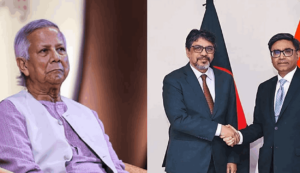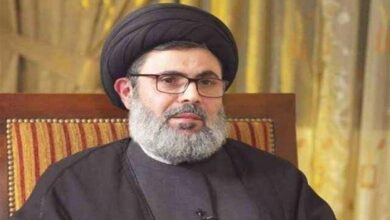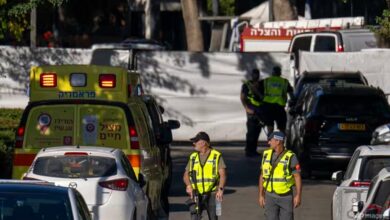Former Indian High Commissioner said: Foreign Secretary Vikram Misri’s statement clearly reflects India’s relations with Bangladesh
According to Veena Sikri, India’s former High Commissioner to Bangladesh, Foreign Secretary Vikram Misri’s remarks about India’s relations with Bangladesh make it abundantly evident that New Delhi is willing to engage with the Dhaka interim government and discuss further cooperation with them.

Speaking to the media, Sikri said that Misri addressed all of India’s issues in his remarks and discussed collaboration. On Monday, Foreign Secretary Vikram Misri traveled to Bangladesh and spoke with top officials including Muhammad Yunus, the Chief Advisor to the Interim Government.
This visit was the first high-level interaction between the two countries since Muhammad Yunus’s interim administration took power in Bangladesh.
When Veena Sikri was asked about Misri’s assertion that “India desires a positive, constructive and mutually beneficial relationship with Bangladesh,” she said, “It clearly highlights that.” Indeed, we are ready to communicate with the temporary administration to continue our collaboration and to let them know that what is taking place is incorrect. Our government is likewise willing to cooperate with the interim administration.
Therefore, he is discussing collaboration as well as the whole range of issues that the Indian government has. Therefore, I believe that the terms he used—constructive and mutually beneficial—are crucial in this context. The advantage to the people of Bangladesh must exist, and I have no doubt that it will, in order to demonstrate that we simply want mutually beneficial partnership.”
During his visit to Bangladesh, the Foreign Secretary informed media in Dhaka that he had a good, open, and honest discussion with his counterparts in the neighboring country. According to Misri, he spoke about every possible topic in the “extremely important bilateral relationship”.
Veena Sikri emphasized that the Indian government has been working to keep bilateral relations normal while welcoming Vikram Misri’s visit to Dhaka. She pointed out that the Foreign Secretary had described his discussions with Bangladeshi authorities as “frank, candid, and constructive,” adding that his choice of the word “constructive” suggests that they want to continue.
“I think it is very good that our Foreign Secretary Vikram Misri, has gone to Dhaka,” Veena Sikri remarked in reference to the visit of Vikram Misri to Bangladesh. Beginning with the events of August 5th, the Indian government has been working on it. The Indian administration has made an attempt to keep the relationship regular. We said on the first day that we are ready to speak with the Dhaka interim government, share opinions, and carry on the positive and mutually beneficial relationship that has been established between Bangladesh and India for many years.
So, it’s great that we can move forward after the Government of India made that initial statement and after our Foreign Minister Dr. Jaishankar met with the Foreign Affairs Advisor of Bangladesh in New York and decided that normalcy should be restored to the talks. Thus, these discussions have now occurred.
She noted that in August, Yunus emphasized that the situation in Bangladesh has persisted with severe gravity and promised Prime Minister Narendra Modi that he would do his utmost to ensure the safety and security of religious minorities.
According to Veena Sikri, “I believe the most significant takeaway from the discussions is that our Foreign Secretary said that the discussion was open, honest, and productive. These three, in my opinion, sum it up. The three adjectives he used to characterize his discussion of ideas in Dhaka are crucial because they demonstrate our desire to continue what he means when he says it is constructive. We want to keep working together.
There are several projects that benefit both parties, including commerce, electricity supply, infrastructure development, and high-profile community development initiatives. We must maintain these projects since they serve the people of Bangladesh and India.
“At the same time, we have been closely monitoring and aware of the events in Bangladesh since August 5th. We also know that even on August 8th, after this communication, Professor Muhammad Yunus called our Prime Minister on August 16th and promised to do all in his power to keep the religious minority safe and secure.
However, we are aware that the situation has remained extremely serious ever since, with attacks on minorities, their homes, businesses, and properties, as well as the kidnapping of women, continuing to be a cause for concern not only in India but also in many other countries across the world. It is crucial to remember that members of every community and religious group have advocated for the preservation of religious minorities in Bangladesh,” she said.
According to her, Indians have unanimously discussed the situation in Bangladesh and brought up the letter that the Citizens for Fraternity Group, led by Drs. Yakub Qureishi and Najeeb Jang, sent to Muhammad Yunus.
“The Citizens for Fraternity Group, led by Drs. Yakub Qureishi and Najib Jang, has actually written to Dr. Muhammad Yunus to express our shame as Indian Muslims over the attacks on minorities in Bangladesh, which are against the principles of Islam,” Sikri said. They will violate Islamic principles.
Therefore, I believe that we have seen a total consensus of opinion about the situation in Bangladesh in India. Our foreign minister made the decision to send the foreign secretary because we wanted things to return to normal for the first time.
The minority predicament has been openly discussed by our prime minister. Since our foreign secretary is also calling on Professor Muhammad Yunus, I’m certain that today’s discussions in Dhaka will be fruitful. Thus, we will soon be aware of that result.
“We are very hopeful that these will, you know, add to the strength of opinion in India on this subject and that the government in Bangladesh, the interim administration in Bangladesh, will no longer be in complete denial about it,” the former Indian envoy said, rejecting the interim administration’s denial about the incidents against minorities, which Indian media have been calling propaganda.
They are unable to recognize that this is Indian media propaganda. The fact that they have been saying that and that Bangladeshi newspapers are publishing lengthy editorials on this propaganda by the Indian media is really astounding, I must say.
I don’t understand since, at the same time that you are receiving this direct input, information about what is occurring in Bangladesh is being sent to West Bengal and every other state. Why are the Bangladeshis acting as if this is propaganda? I am quite surprised since I know a lot of individuals who are saying this.
She said that the minority population in Dhaka has made eight demands of the government, including a statute protecting minorities. She discussed how individuals who have vandalized minorities’ houses of worship have gone unpunished by Bangladesh’s interim administration.
“We’ve seen the very strong meetings in Bangladesh by the minority community, by the Hindus, Buddhists, and Christians,” Sikri remarked in reference to the state of minorities in the country.
We don’t want to leave Bangladesh, they have said. This is our nation. We are citizens. They have made eight demands of the Dhaka government, and we want our rights. Quite straightforward, you know, requesting a law protecting minorities, a ministry for minorities’ protection, and that those responsible for all these violent and destructive acts be held accountable for the destruction of temples, desecration of temples, vandalism of churches, and vandalism of Buddhist shrines.”
Therefore, justice should be served and those responsible for all of these crimes should be taken into custody. We saw someone stealing the Golden Crown that our Prime Minister had bestowed at the well-known Jeshoreshwari Temple in Dhaka.Therefore, they claim that this is still propaganda. However, despite all of these images, nothing has been done. There have been no arrests. Therefore, I believe that the visit of our foreign secretary would be quite beneficial in this respect,” she said.
In Bangladesh, extremist extremists have attacked Hindus and other minorities on many occasions. Additionally, there have been instances of sacrilege and vandalism of temples and deities, as well as burning and looting of the houses of minorities.
Protests followed the October 25 arrest of priest Chinmoy Krishna Das in Chittagong.The arrest and refusal of bail for Chinmoy Krishna Das, the spokesman for the Bangladesh Sammilit Sanatan Jagran Jote, was reported with great concern by India on November 26.





